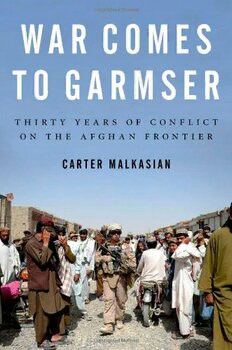
War Comes to Garmser: Thirty Years of Conflict on the Afghan Frontier PDF
Preview War Comes to Garmser: Thirty Years of Conflict on the Afghan Frontier
WAR COMES TO GARMSER This page intentionally left blank War Comes to Garmser Thirty Years of Conflict on the Afghan Frontier CARTER MALKASIAN 1 Oxford University Press Oxford University Press is a department of the University of Oxford. It furthers the University’s objective of excellence in research, scholarship, and education by publishing worldwide. Oxford New York Auckland Cape Town Dar es Salaam Hong Kong Karachi Kuala Lumpur Madrid Melbourne Mexico City Nairobi New Delhi Shanghai Taipei Toronto With offices in Argentina Austria Brazil Chile Czech Republic France Greece Guatemala Hungary Italy Japan Poland Portugal Singapore South Korea Switzerland Thailand Turkey Ukraine Vietnam Oxford is a registered trade mark of Oxford University Press in the UK and certain other countries. Copyright © 2013 by Carter Malkasian Published in the United States of America by Oxford University Press 198 Madison Avenue, New York, NY 10016 Published in the United Kingdom in 2013 by C. Hurst & Co. (Publishers) Ltd. All rights reserved. No part of this publication may be reproduced, stored in a retrieval system, or transmitted, in any form or by any means, without the prior permission in writing of Oxford University Press, or as expressly permitted by law, by license, or under terms agreed with the appropriate reproduction rights organization. Inquiries concerning reproduction outside the scope of the above should be sent to the Rights Department, Oxford University Press, at the address above. You must not circulate this work in any other form and you must impose this same condition on any acquirer. Library of Congress Cataloging-in-Publication Data Malkasian, Carter, 1975– War comes to Garmser : thirty years of conflict on the Afghan frontier / Carter Malkasian. pages cm Includes bibliographical references and index. ISBN 978-0-19-997375-0 (alk. paper). 1. Malkasian, Carter, 1975– 2. Helmand (Afghanistan)—History, Military. 3. Afghan War, 2001—Campaigns—Afghanistan—Helmand. 4. Afghan War, 2001—Personal narratives, American. 5. Postwar reconstruction—Afghanistan—Helmand. 6. Helmand (Afghanistan)— Politics and government. 7. Helmand (Afghanistan)—Ethnic relations. 8.Taliban—History. 9. Afghanistan—History—Soviet occupation, 1979–1989. 10. Helmand River Valley (Afghanistan)—Social life and customs. I.Title. DS371.412.M333 2013 958.104′71092—dc23 [B] 2012045788 9 8 7 6 5 4 3 2 1 Printed in the United States of America on acid-free paper CONTENTS List of Maps vii Foreword ix Acknowledgments xiii Preface: Small Places xv 1. Grand Plans 1 2. The Jihad 17 3. Civil War 41 4. The Taliban Regime 53 5. Victory into Defeat 71 6. The Second Taliban Regime 103 7. Pushing Farther South 127 8. Wakil Manan, Mian Poshtay, and the Riots 159 9. The Alizai Return 181 10. The Taliban Counter-offensive 195 11. Winning the Peace 221 Conclusion: The End or the Intermission? 263 List of Names 275 List of Tribes and Political Entities 281 Glossary of Terms 283 Notes 285 Bibliography 307 Index 311 v This page intentionally left blank LIST OF MAPS MAP 1: Helmand province (Sebastian Ballard), [Verso front endpaper]. MAP 2: Tribes of Garmser (Sebastian Ballard), [Recto front endpaper]. MAP 3: Afghanistan (Sebastian Ballard). xxv MAP 4: Garmser district center (Mike Markowitz). 25 MAP 5: Garmser’s civil war (Mike Markowitz). 43 MAP 6: Assault of the 24th Marine Expeditionary Unit on Hazar Joft and Amir Agha (Mike Markowitz). 122 MAP 7: British and Afghan outposts, September 2008–June 2009 (Mike Markowitz). 130 MAP 8: The surge in Garmser (Sebastian Ballard). 146 MAP 9: The Garmser riots (Sebastian Ballard). 168 MAP 10:Taliban Intimidation Campaign, spring and summer 2010 (Sebastian Ballard). 197 MAP 11:Marine, Afghan army, and police posts in Garmser, c. January 2011 (Mike Markowitz). 218 vii This page intentionally left blank FOREWORD In 1972, Jeffrey Race published War Comes to Long An, a first-person analysis of the war in Vietnam. It was a stunningly original work on war, observed from the inside by an American who was deeply embedded in the language, culture, and politics of the province. Race was a former Army officer who lived in Long An for four years conducting research that became his doctoral dissertation. The book he published is cited as a classic in the 2006 US Army/Marine Corps Counterinsurgency Field Manual; for forty years it has had no equal in the depth of understand- ing it provided of an internal struggle for the soul of a very small place. Carter Malkasian has followed in his footsteps. Malkasian came to Afghanistan’s Garmser District in 2009 as a political officer for the U.S. State Department. Like Race, Malkasian had previous experience of war; his doctoral dissertation on Korea and Vietnam was closely followed by years of service as a counterinsurgency adviser to the Marine Corps in Iraq and Afghanistan. He spent nearly two years in Garmser during the “surge” of US civilians to Afghanistan, teaching himself Pashto and getting to know local leaders from the provincial level down to village elders. But wars have at least two sides, and like Race, Malkasian also became well acquainted with leaders of the insurgency that threatened his province, enabling an intimate understanding of the dynamics of the local conflict. The most important difference between the two books is that Race sought to understand the war in Long An as an academic exercise, albeit one in which he was immersed. In Garmser, Malkasian’s search for knowledge was of immediate practical importance as he worked to cob- ix
